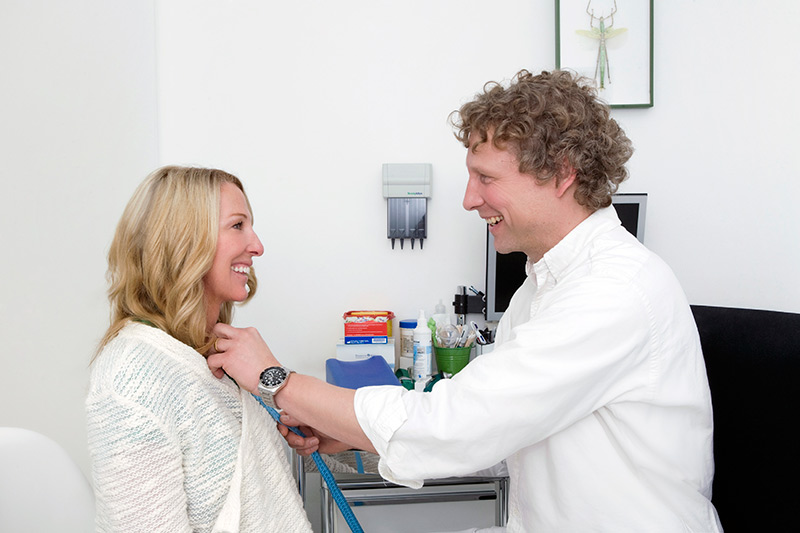Vaccinations
Vaccinations are some of the most effective and important preventative measures in medicine.
Modern vaccinations are well-tolerated, undesired side effects are rare.
The direct goal of the vaccination is to protect a person from an infection. By obtaining high vaccination rates, it is possible to eliminate certain pathogens first locally, then globally.
The Medical Team 42 follows the recommendations of the Vaccination Commission of the Robert-Koch-Institute and we always counsel you individually and adjust accordingly.
Tetanus, diphtheria and pertussis (whooping cough)
Even in Germany every person should be protected against tetanus and diphtheria.
Your most recent vaccination should not be more than 10 years ago. In case of injuries, tetanus vaccinations must be refreshed after five years, better at home than in foreign countries! Costs are covered by all health plans.
Pneumococci
These are bacteria that cause severe infections. They can be especially dangerous in infants, small children, elderly people and those with chronic illnesses. Worldwide about 2 million people die every year because of an infection caused by pneumococci, including more than a million children under five years of age that die of pneumonia. In Germany, 75,000 people fall victim to pneumonia each year.
Even though antibiotics are applied, half of these deaths occur within the first 48 hours. During the acute phase, mortality is around 8%, in the following months an additional 5%.
The Vaccination Commission has recently updated their vaccination recommendation to include the following:
- All persons 60 years and up
- All children from the 2nd month to the 2nd year
- Children, youth and adults with increased risk due to an underlying illness such as diabetes
Tick-Borne Encephalitis (TBE)
This is an illness caused by the TBE virus that shows up with flu-like symptoms, fever and in some patients encephalitis, a brain and meningeal infection.
The majority of the patients however does not display these symptoms.
A causal treatment of TBE is not possible. The disease is transmitted through the bite of an infected tick in high-risk areas. In addition to common protective measures such as scanning your body after having been in the woods, the active vaccination is the most important preventative measure.
In the state of Baden-Wuertttemberg, considered a high-risk area, this vaccination is covered by all health insurance plans.
Flu shots
The flu shot is a preventative measure to avoid an influenza infection, not to be confused with the common cold.
We recommend conducting the vaccination each year between September and November. A vaccination is also possible at a later time, because the full effect takes place within 7 to 14 days of the vaccination. The protection remains in effect for 6 up to 12 months.
Cervical cancer vaccination
In Europe, cervical cancer is the second most prevalent cause of cancer deaths behind breast cancer in young women between 15 and 44 years. About 33,500 women in Europe annually receive the diagnosis of cervical cancer, and 15,000 die every year. This corresponds to a daily mortality rate of 40 women in Europe.
Cervical cancer is caused by the human papilloma virus (HPV). The connection between the HPV infection and cervical cancer is stronger than the one between smoking and lung cancer. Roughly 70% of sexually active people could be exposed to the papilloma virus during their lifetime. Genital infections with the HP virus are frequent. The human papilloma virus is highly infectious.
In general, the virus is eliminated without intervention and it causes no symptoms. However, in a relevant number of cases, the infection with the virus can lead low-level lesions of the cervix and to external genital lesions including genital warts. In some cases these can develop into higher-level lesions or pre-cancer, which can lead to cervical cancer.
Why are insurance plans covering this vaccination from 9 years up?
Because the HP virus is transmitted through sexual intercourse, it is important to vaccinate girls before their first sexual activity. The vaccination is approved from 9 years on. After the vaccination, resistance against 70% of cancer-causing virus forms is established.
How was the effectiveness of the vaccine confirmed?
The causal connection between the infection with a certain virus (HPV) and the occurrence of cervical cancer has been established. The new vaccination protects against 70% of cancer-causing HP virus variations. The approval of the vaccine took place on the basis of four clinical studies with about 20,000 participants over four years, ranging from 16 to 26 years of age.
When does the vaccination need to be repeated?
The confirmed effectiveness of the vaccine is at five years. Whether a refresher is necessary is currently being verified in a follow-up study in Scandinavia.
Can the cancer check-up be skipped?
Even for vaccinated women it remains important to regularly use the check-ups for early detection of cervical cancer, because not all cancer-causing virus types are covered by the vaccination. The regular check-ups prevent cancer. By conducting pap-smears, changes in the cells of the cervix can be recognized early and treated immediately. This exam is offered annually to women once they have reached the age of 20. The cost is covered by all plans.
Are there any side effects?
The most frequent side effects are harmless. Just like in other vaccinations, they include rare cases of elevated temperature and local reactions at the injection site (reddening, pain and swelling). No other relevant side effects habe been reported.





